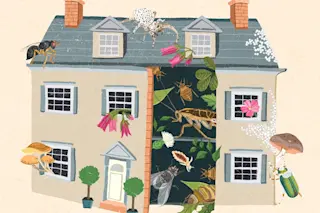You can accept that many of the insect species around you are interesting, poorly studied and more likely to help control pests than to be them. Or you can go to war.
The modern way to wage such a fight is with chemistry. But be warned: If you decide on a chemical war, the battles are not evenly matched. Not even close. To each round of new chemicals we apply, the insects we attack respond by evolving via natural selection. The more aggressive the attack, the faster the evolution. Insects evolve faster than our ability to understand how they have evolved, much less counter it. It happens again and again, especially among those pests we try hardest to kill, such as the German cockroach (Blattella germanica).
The pesticide chlordane was first used in homes in 1948. It was so toxic to insects that it was thought to be invincible. By ...















